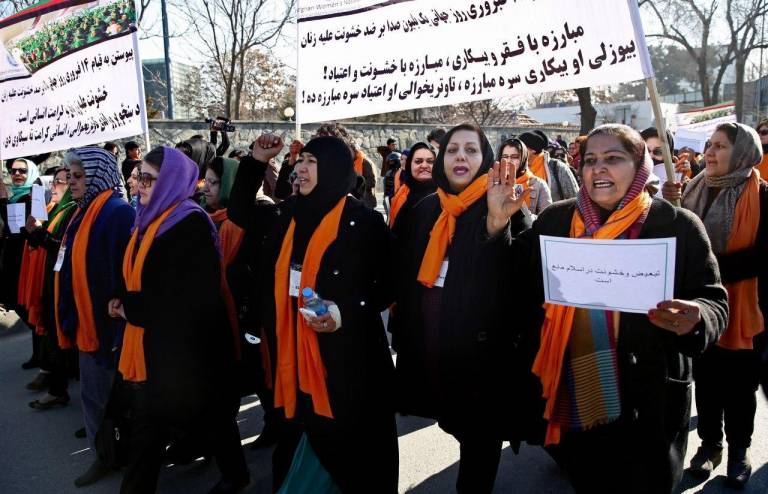Just few days before the International Women’s Day, 8th of March, the United States signed a peace deal with the Taliban the presence of high level representatives from some regional countries in Doha, capital of Qatar. The militant group denied very basic rights of the women during their rule in Afghanistan, and have continued to impose harsh restrictions on women in areas under their control after 2001. The Taliban field commanders have stoned several women to death in parts of Afghanistan while their negotiators have been holding direct talks with the US Special Representative for Afghanistan Reconciliation, Zalmay Khalilzad, in Doha which might facilitate the group’s return to power.
Days after the US-Taliban agreement was signed, Khalilzad met a group of Afghan female entrepreneurs in Kabul. In the meeting, he assured that the US has “many means of diplomatic leverage that do not require brute force” to use them for protecting gains made over past 19 years. “We … will not hesitate to use every tool to ensure that a future Afghanistan builds on the gains of the last 19 years,” he wrote in a tweet posted on March 07. However, with the “means of diplomatic leverage” the US has failed to bring the Taliban to negotiating table with the Afghan government backed by Washington and its allies since 2001. Now, the US is making its last efforts to include the Afghan government in a negotiation team that will discuss a post-peace political set-up in Afghanistan—another setback against the Taliban’s unwavering position of denying to talk with Afghan government as an independent state.
Moreover, the US-Taliban peace deal seems more disappointing when it comes to defending the achievements made over past 18 years, mainly in regard with protecting the women’s rights. Though, the brutal and powerful deputy leader of the Taliban, Sirajuddin Haqqani, stated in a piece published on New York Times that on building “an Islamic system in which all Afghans have equal rights, where the rights of women that are granted by Islam—from the right to education to the right to work –are protected”, there is no commitment from the Taliban regarding the women’ rights in the agreement they have signed with the United States. In an exclusive interview with TOLOnews aired on Wednesday night, March 11, when he was asked about the missing words like women, democracy, and human rights in the agreement, Khalilzad described such topics as national issues of Afghanistan that will be discussed in intra-Afghan talks. He, however, reiterated that the US will use its influence to secure presence of women around the negotiating table and will cooperate with them during the talks.
Position of Afghan women
In a close harmony with most of other Afghans who think the US is just looking for a face-saving withdrawal from Afghanistan, a number of Afghan women express skepticism over the US-Taliban peace deal and the subsequent intra-Afghan talks. Though too disappointed they look, these women are still firm in calling for their hard-won rights to be protected and ensure their future role in a post-settlement Afghanistan.
Aziza Khair Andesh, who is a women’s rights activist in the western Herat province, describes the US-Taliban peace agreement disappointing for the Afghan people. “The agreement does not protect interests of Afghanistan. It only considers interests of the Taliban and the US,” she notes while pronouncing the 35-minutes long phone conversation between the US President Donald Trump and the Taliban deputy leader Mullah Abdul Ghani Baradar as a sign of providing more recognition for the group than for the Afghan government.
Taking on the intra-Afghan talks, she stressed that the fundamental rights of every citizen should be protected. “All recent achievements like freedom of press, freedom of speech, freedom of gatherings and civil activities should be protected in case if there is any peace [deal],” she asserted.
Another women rights activist, Freshta Yaqubi, believes that the women are now informed and capable to raise their voices against “such agreements” in order to defend their rights. “The potential consequences of the agreement is concerning,” she further lamented about the US-Taliban peace accord.
Orzala Ashraf Nemat, who is leading Afghanistan Research and Evaluation Unit, a well-known and leading Afghanistan research organization, thinks that the Taliban whom the US has struck the peace agreement are even more radicals than those who ruled Afghanistan in late 1990s. She, however, believes that restoration of the Taliban’s emirate is not possible. “We do know that restoration of the Taliban Emirate is not possible because Afghanistan has undergone a big change, the young generation has changed. The Afghan people cannot accept [restoration] of that era at all,” she added.
“The Taliban must realize that the women will never surrender to their ignorance,” Mrs. Nemat asserted while stressing on preserving women’s role in different arenas like society, politics, and decision making positions under a new administration after a likely peace deal with the Taliban.
When asked about her position on a possible amendment of the Constitution, Mrs. Nemat noted that it should be amended only in accordance with its article 183 just for the sake of improving the citizen’s rights, not to deny it. “There is no need for a full amendment of the constitution or revoking it. We expect the Taliban to listen to the people of Afghanistan,” she asserted.




